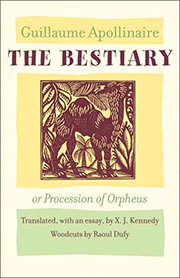Unlike certain 19th-century poets of difficult character or seemingly foredoomed, whom Paul Verlaine called maudits (accursed)—Rimbaud, Gérard de Nerval, Corbière, Verlaine himself—Guillaume Apollinaire (1880-1918) was a pleasant, cheerful fellow. He, too, suffered misfortune, including illegitimate birth and absence of a father, unrequited love, wounding in the Great War, and premature death during the influenza epidemic of 1918. But he did not generally bring misfortune upon himself, as Verlaine and Rimbaud did, and he was not subject to depression—unlike Nerval, who hanged himself, and Corbière, who suffered from isolation and endured horrible winters in his Breton boarding school. Apollinaire’s many lasting friendships in the art and literary world in early 20th-century Paris attest to his good humor, as well as to his lively spirit. The present bilingual edition of his work is appealing, with good deckled-edge paper, attractive font, sepia-toned printing, charming Dufy woodcuts, a short essay by the translator, notes, and a 1905 drawing by Picasso depicting Apollinaire, various beasts, and a magician (suggesting Orpheus or Trismegistus, magi with whom the poet identified).
Apollinaire was born in Rome, the son of a minor Polish noblewoman, Angelika Kostrowicka (or Kostrowitzsky), and a father long unidentified—but almost surely Francesco Flugi d’Aspermont, a military officer. Apollinaire’s christening names included Guillemus and Apollinaris. His aventurière mother took him and his brother hither and yon—Monaco (where in school he did brilliantly), France, Belgium; they once left a hotel without paying. Settling in Paris in 1899, he started working as a journalist and an art critic. His first book publication was in prose, L’Enchanteur pourrissant; he published other prose works, including stories, a book on Cubism, a manifesto on the “new spirit,” and a play. Poetry was his chief genre, however. He had one of the most original poetic imaginations of his generation. Two years after Le Bestiaire appeared (1911), he brought out Alcools, a varied, lyrical collection; Calligrammes appeared the year of his death. The fact that he removed from the proofs of Alcools all punctuation would suggest an unbridled modernist impulse. In fact, however, he is in many respects a classic among the modernists. He used fixed forms often, and in Alcools one scarcely misses punctuation, thanks to his brilliant craftsmanship.
The 30 original poems of Le Bestiaire, to which four others (excised from the original edition or published elsewhere) are added here, are all short (four lines, five—a stanza form Apollinaire favored—or six), rhymed, in octosyllabic lines or alexandrines, and punctuated. Orpheus and the Sirens appear, as well as animal subjects. The genre is an old one. The first extant instance, in Greek, dating from the early Christian era, was a compilation of previous material from Aristotle, Pliny the Elder, and others. Latin bestiaries appeared before the High Middle Ages, and subsequently others were compiled in French and other Western European languages.
Despite his modernism, Apollinaire favored the Middle Ages, motifs and forms of which appear elsewhere in his work. He was an inveterate seeker of curiosities in libraries and bookstalls; he must have been acquainted with medieval models.
Both fancy and delightful simplicity (joined to considerable lore) prevail in these little lyrics, frequently epigrammatic. The poet’s trick is to select an aspect or imagined feature of an animal, then play with it or relate it, often allegorically, to human experience, opening out the image. Love is a recurring theme. The quatrain “Flea,” for instance, treats the insect as an image of love’s ambivalence: “Fleas—friends, even lovers / How cruel are those who suck / Our blood in loving us . . . ” (John Donne likewise drew a lesson, somewhat different, from the little bloodsucker.) The poem “Devilfish” acknowledges that the poet himself practices such vampirism. In “Serpent,” he exclaims over the snake’s victims—“Eurydice, Cleopatra, Eve”—adding, “and more / Of their kind. I know three or four.”
Apollinaire’s tone is often tender, as in lines on the Tibetan goat, whose silken hair, like the Golden Fleece, is worth less “than the locks of my own loved one.” The cat is pictured “stepping over books,” an image of domestic contentment. Mice—a metaphor for lovely days—gnaw away life. Religious images are numerous. The ox (shown by Dufy as soft-eyed and winged) is a cherub, praising paradise. The dove is connected to the Spirit and, thus, Christ; the grasshopper to Saint John. Orpheus is associated with the birth of light, elsewhere with the “Choir of Heaven”—still elsewhere with fishing (recalling the fish’s emblematic function in Christian iconography); the heart is a bait cast to heaven to “catch” the “divine fish, JESUS.” A pun in the original on pécheur (“sinner”) and pêcheur (“fisherman”) is untranslatable. Dufy’s illustration for that poem is both pious and fanciful.
X.J. Kennedy appreciates French and has the requisite poetic tact. Rather than force himself to follow the original syntax and translate everything as literally as possible, he rephrases, omits or adds a word, and can be satisfied with imperfect rhymes, or none. Yet one frequently finds great fidelity to the French, as in the poem on the Sirens: “Sea, I’m like you: machined cries fill my ears. / My vessels sing. They call themselves the years.” (The “machined cries,” modern sirens, are presumably those of ships’ engines or whistles, or, for the poet in Paris, street and factory noises; Apollinaire was fond of the cityscape and its sights and sounds.)
A few errors can easily be corrected in future printings. Le Bestiaire first appeared in 1911, not 1909 (p. vii); peut should be peux (p. 12); les should be le (p. 18); souris, “mouse” (p. 22), is feminine; suit (p. 50) should be suis. No matter; this tasteful volume is just right as a gift for those who have a discerning eye and ear and appreciate the poetry of the natural world.
[The Bestiary, or Procession of Orpheus, by Guillaume Apollinaire, translated, with an essay, by X.J. Kennedy (Baltimore: The Johns Hopkins University Press) 75 pp., $45.00]

Leave a Reply